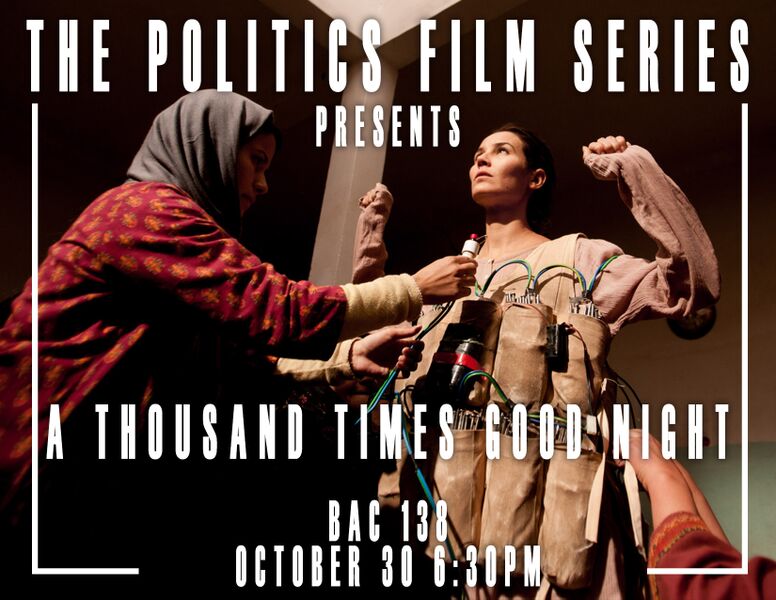The Politics Film Series hosts a screening every Friday at 6:30PM in BAC 138. The series features films which deal with contemporary, classic and critical political problems. Film is one of the most salient mediums for communication. It enforces a single perspective yet offers a plurality of viewpoints. Image and audio come together in a contained space but evokes responses which rupture this comforting frame. Walter Benjamin described it as “the training ground” for modern perception. In this way, the film is both an ordinary experience and experience which exposes the ordinary. Perhaps most importantly, film is a media which individuals may experience collectively. To this end, the evening will conclude with an open discussion on the movie lead by Dr. Geoffrey Whitehall. All Acadia students and members of the community are welcome to attend and encouraged to bring beverages and snacks of their choice.
A Thousand Times Good Night – October 30
Rebecca is a photojournalist torn between war’s frontlines and her family. After an assignment following a group of female suicide bombers in Kabul, Rebecca returns home to Ireland. She is soon drawn back to her work, this time with her daughter in a Kenyan refugee camp which comes under attack. Though framed as a personal drama, the film asks what is the responsibility of foreign journalists in war? How are lives made visible? What is seductive about the struggle and suffering of others?
Five Broken Cameras – November 6
Emad Burnat’s camera bears witness to the Israeli settlement of the West Bank – until each is inevitably destroyed. He documents the bulldozing of villages, uprooting of olive trees, and the maiming and deaths of his neighbours. The immediate perspective of the documentary sheds fresh light on what is perhaps the most polemic conflict in the world today: is Israel a colonial power? How do we make sense of the self-documented experiences of Palestinians? What does resistance look like for those on the margins?
Cache – November 13
A seemingly ordinary French couple receives an anonymous tape of their apartment. Over the following weeks, other tapes and cryptic child-like drawings begin to arrive. The family is soon confronted by a long-buried secret about their past. The film provokes unexpected questions such as : what is the legacy of colonialism? How can institutions control the flow of information? What does it mean to see another? How do we appreciate our impact on the lives of those we may not see? Who or what is truly terrifying?



